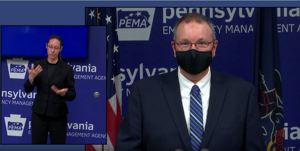Pennsylvania emergency management officials say legislative process too slow for disaster response

(The Center Square) – Pennsylvania’s emergency management officials said Thursday the legislative process moves too slowly to make the snap decisions required in a disaster situation.
“Sometimes decisions are extremely timely and need to be made with the data on hand,” said Randy Padfield, director of the Pennsylvania Emergency Management Agency. “The legislative process is the legislative process. It’s designed to be debated, to be talked about, and that does not lend itself well to a lot of what we do in public safety and emergency management.”
Padfield’s comments came during a news briefing about two proposed constitutional amendments that voters will weigh in on during the May 18 primary election. If enacted, the General Assembly must approve any disaster declarations extended beyond 21 days.
It’s a reactionary policy that could hamper the state’s emergency response capabilities in unforeseen ways, Padfield said. Gov. Tom Wolf has extended Pennsylvania’s 90-day disaster declaration four times since the first cases of COVID-19 became public on March 6, 2020.
He’s used the broad emergency powers to waive licensing requirements for health care professionals, access federal disaster aid and deploy the National Guard into nursing homes, at testing sites and elsewhere across the state as outbreak emerged.
Legislative Republicans argue that Pennsylvania’s 90-day declaration far exceeds the 30-day limit most other states follow. It also gave the administration excuse to enact economic and travel restrictions without input from the General Assembly – a choice they insist worsened unemployment and crippled small business without public health data to back it up.
“We’re on the ground floor, so to speak, listening to the people of Pennsylvania,” Senate President Pro Tempore Jake Corman, R-Benner Township, said Tuesday. “We’re not at PEMA. We are out in the community and listening to their frustrations.”
Padfield warned legislators against viewing future emergencies declarations – which often are triggered by natural disasters, civil unrest or, since 2016, the opioid crisis – through the lens of the COVID-19 pandemic.
“The threats we face are becoming more complex, and our ability to respond must remain flexible enough to meet the preparedness, response and recovery responsibilities that the executive branch of government is responsible for,” he said. “While most natural disasters are short-lived, they have a long and complex recovery period that can take weeks, months, or even years.
Disclaimer: This content is distributed by The Center Square

